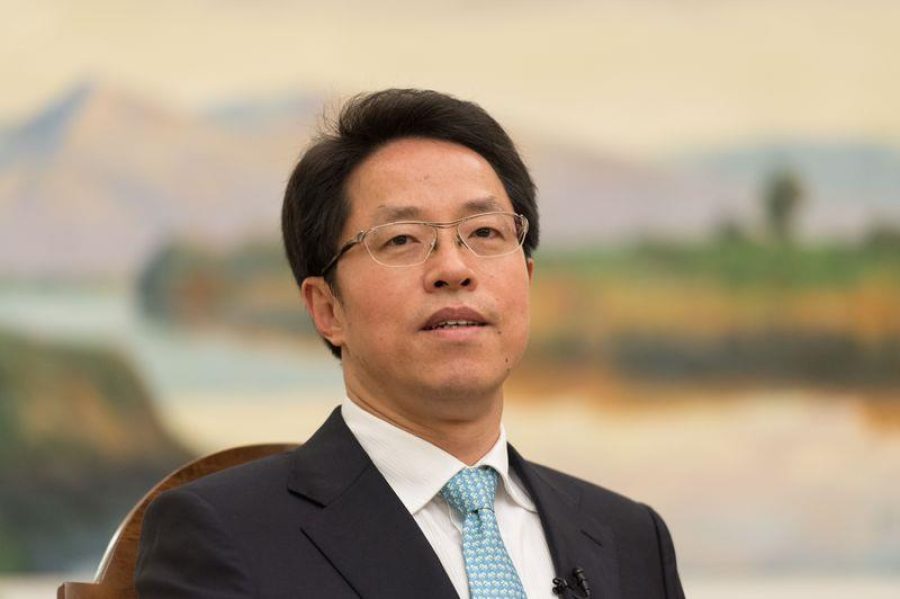Although Macau is not a big place, it has an “important and unique position” in the successful implementation of the “One Country, Two Systems” principle, apart from having many other highlights, Hong Kong and Macau Affairs Office of the State Council Director Zhang Xiaoming says.
Zhang made the remarks during a press briefing on the sidelines of the current annual session of the National People’s Congress (NPC) at the Great Hall of the People in Beijing on Friday. His remarks have been released on the Chinese-language website of the office.
His remarks came in response to a question by a reporter from Shenzhen, who asked Zhang what his evaluation of Macau’s implementation of the “One Country, Two Systems” principle since its return to the motherland nearly 20 years ago was.
Zhang said that the 20th anniversary celebration on December 20 was a “great event” not only for Macau but also a “major and happy event” for the whole nation.
Zhang, an alternate member of the 18th Central Committee of the Communist Party of China (CPC), underlined that since its return to the motherland in December 1999 Macau has enjoyed one of the fastest economic growth rates in the world, and its per capita GDP is now one of the world’s highest.
According to Zhang, Macau’s per capita GDP now ranks second in the world, behind Luxembourg.
Zhang, 55, also pointed out that Macau residents enjoy a “very high” life happiness index. He also stressed that Macau’s unemployment rate of 1.8 percent practically amounts to full employment.
Zhang, a former director of the Liaison Office of the Central People’s Government in Hong Kong, also pointed out that Macau provides a wide range of free medical care and has been rated as a “Pacific model” by the World Health Organisation (WHO).
Zhang also pointed out that Macau has one of the highest life expectancies in the world and that it is a very popular tourist destination that receives, on average, 100,000 visitors every day. He also underlined Macau’s importance as a culinary tourism destination and its official status as a UNESCO-recognised Creative City of Gastronomy. He indicated that Macau’s rich cuisine might have something to do with its residents’ high degree of happiness.
Zhang stressed that Macau’s public security situation has “fundamentally improved” since its return to the motherland, pointing out that in the four years before the 1999 change in administration Macau’s “underworld activities were rather rampant”, apart from negative economic growth, a high unemployment rate, and an unsafe law and order situation.
National sovereignty
Zhang praised Macau people and their government for “resolutely safeguarding national sovereignty” and the nation’s security and development interests. He also praised Macau for having legislated on Article 23 of the Macau Basic Law “as early as in 2009”. Hong Kong still has to legislate on Article 23, which concerns state security.
Zhang also praised Macau’s schools for embracing the national flag and national anthem.
Economic structure problems
Zhang admitted that Macau still has its own problems, mainly because of its economic structure. He emphasised that Macau is still “too dependent” on the gaming industry. However, Zhang praised the Macau government and people from all walks of life for working had to develop emerging industries such as the conference and exhibition sector, traditional Chinese medicine (TCM), financial businesses with special features, and the cultural and creative industries.
He also mentioned Macau’s ongoing efforts to become a world centre of tourism and leisure, and a service platform for trade and economic relations between China and Portuguese-speaking countries. He said that the central government was “fully supportive” of Macau’s economic development and diversification efforts.
Xi’s instructions
Zhang also pointed out that CPC General Secretary Xi Jinping has a keen interest in Macau matters, such as his instruction concerning the special administrative region’s adequately diversified economic development. He also stressed the “important instructions” given by Xi when meeting Chief Executive Fernando Chui Sai On during the latter’s annual duty visit to Beijing in December last year.
Zhang also said he believed that with the central government’s support and the joint efforts of the government and people of Macau, as well as the backing of Guangdong, Macau “will be able to gradually resolve all its development problems”, adding that “Macau’s prospects are the same as those of our great motherland. It will get better and better.”Zhang also praised Macau for its strong commitment to the Greater Bay Area (GBA) conurbation project. He also said that innovation was a key factor in getting the GBA development off the ground, apart from the need to promote “convergence” among Guangdong, Hong Kong and Macau, considering that three different jurisdictions and separate customs areas are involved.
4 requirements for CE
When asked by a Hong Kong reporter about Macau’s upcoming chief executive election, Zhang said there were four “consistent” requirements that the central government expects from any chief executive candidate in Macau: loving the country and Macau, being trusted by the central government, having the ability to govern and being recognised by Macau society.
Zhang said he believed that Macau will be able to elect a new chief executive who meets these criteria. He also said the election was slated to take place in August.
Legislative Assembly (AL) President Ho Iat Seng said last month he was “actively and prudently” considering running for chief executive. Ho, 61, is Macau’s only member of the NPC Standing Committee. Ho is a veteran community leader and lawmaker.






